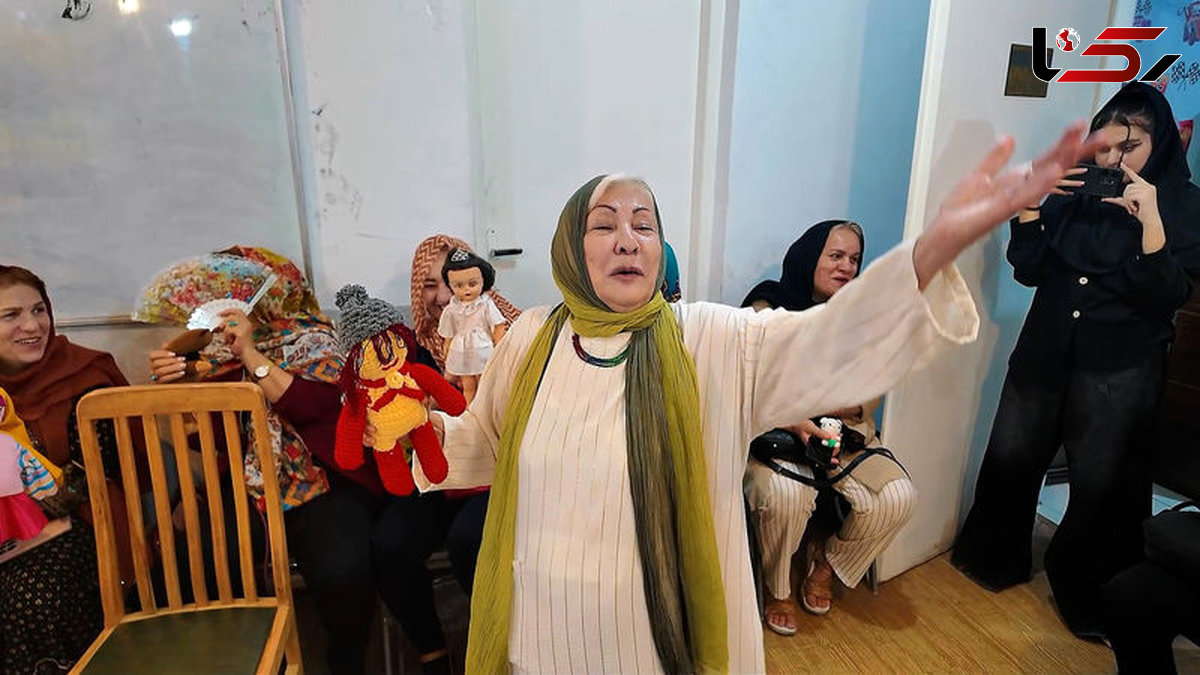Rokna Reports
Memory, Healing, and Dolls: A Unique Journey for Tehran’s Women+ Video Interview with Ashraf Sehat
Rokna: In a storytelling class at the Dabestan Community Center, elderly women, guided by Ashraf Sehat, are turning their loneliness and sorrow into life and hope—one handmade doll at a time.

Rokna Social Desk reports:
In the quiet alleys of a central Tehran neighborhood, laughter echoes through the halls of a local community center—not from a classroom or children’s party, but from a room filled with elderly women rediscovering joy, purpose, and companionship through handmade dolls and shared memories.
At the heart of this transformation stands Ashraf Sehat, a white-haired woman with a calm face and a voice filled with warmth and conviction. A former sports coach, mountaineer, and history graduate, Sehat has turned her passion for storytelling and community into a powerful movement that has helped dozens of elderly women find new meaning in their golden years.
Years ago, Sehat realized that aging for women shouldn’t mean a life confined to pills and sofas. Instead, she created a space for conversation, laughter, and reflection—a place where dusty memories could once again breathe and shine. What began as a modest memory-sharing class at Tehran’s “Dabestan” neighborhood center soon grew into a vibrant and healing circle of voices, laughter, and dreams.
In her classes, sorrow stays at the door. Only joyful memories, bright recollections of childhood, and playful imagination are allowed in. Women who once battled depression, isolation, or the fear of speaking in public now sit confidently, telling stories, listening intently, and embracing one another with hope.
But these gatherings go beyond words. Sehat regularly leads her students outdoors for walks and exercise, sometimes even hosting them at her own villa in northern Iran—a place of freedom, rest, and communal joy. Whether cooking, walking, or reading under the trees, these women thrive in the company of one another.
One day, Sehat introduced a new project: each woman would create a doll—not just a lifeless toy, but a companion, someone to dress, feed, talk to, and nurture. Some brought childhood dolls from home; others crafted new ones with the same hands that had built homes and families for decades.
The women got to work with childlike enthusiasm. One woman named her doll “Gisoo,” with thick black hair, in honor of her daughter battling cancer and undergoing chemotherapy. Gisoo became a symbol of beauty and resilience, To bridge the pain of today with the comfort of the past.
Another named hers “Shadi” (Joy), hoping that happiness would remain close. One made a colorful knitted doll named “Gholi,” a promise fulfilled to Ms. Sehat. She even made a second Gholi as a token of gratitude and affection.
Despite her husband's hospitalization, one woman stayed up late into the night finishing her doll—a quiet statement that life, laughter, and love still had a place in her heart.
Another crafted a cradle, just like those from her childhood, using cardboard and small sticks. Inside rested a doll named Pari, gently rocked by her mother Goli’s loving hands—an echo from a distant past.
One woman brought in a doll named Sepideh, a "40-year-old bride" dressed in a handmade wedding gown. She had once dreamed of naming her first daughter Sepideh, a dream that never came true. But in this doll, that dream lived on. A former hairstylist, she had carefully braided Sepideh’s hair and adorned it with delicate pearl beads.
In this class, the women craft dolls—but in truth, they are rebuilding forgotten parts of themselves. They gently tend to old, hidden wounds and breathe life into dreams that may never have found a place in the real world.
Here, in the Dabestan community center, these women have risen again. They no longer wait for someone else to heal them. They mother themselves. For the dolls born from their hearts, they sew clothes, cook meals, tell stories—and sometimes, quietly shed a tear.
This is a house of hope. A home of renewed laughter. A place shaped by Ashraf Sehat—a woman who redefined life through mountains and words, through movement and meaning. A woman who taught others:
“You can always begin again. All it takes is to sew a button, plant a smile, and make a doll—hand in hand.”
Send Comments